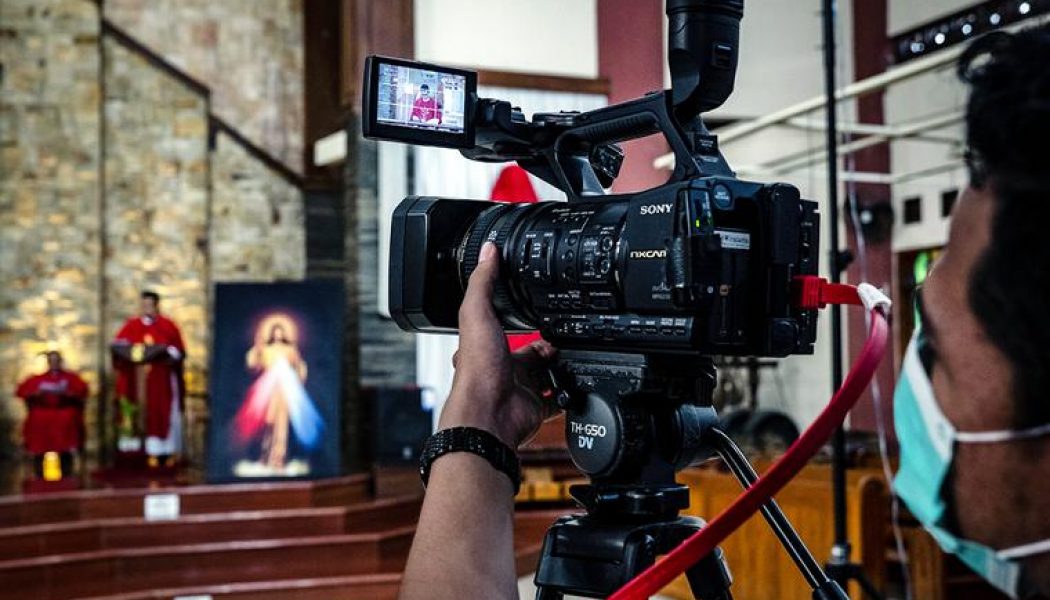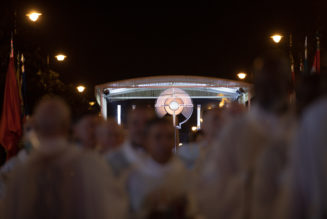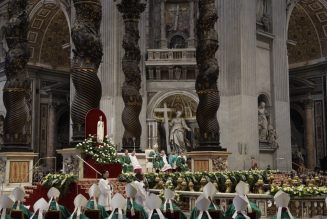
In the first part of this reflection we reviewed the painful year of 2020, focusing on the social and political ramifications of the COVID-19 pandemic. This installment examines the Church’s response to the situation. Sadly, we didn’t handle things well, but I am hopeful that we have learned some valuable lessons. I am sympathetic to the fact that the initial reports on the potential impact of COVID-19 were dire. Nevertheless, given that hindsight is “20/20,” let’s look back at and examine the mistakes we made so that we can avoid them in the future.
First, we should not have completely suspended public Masses. While it may have been necessary in some (or maybe even many) cases, it was not necessary in every case. Even at the height of the pandemic shutdowns, meetings of 10 or fewer were still allowed in most areas. Early on, several dioceses completely suspended public Masses even though their governor still permitted gatherings of up to 250 people; others did so when 50 were still permitted by the governor.
Why was this done? If only 10 were permitted, then we should have celebrated Masses for 10 people, especially the most devout daily Mass attendees. Why close down entirely? Even when there were “stay-at-home” orders, a visit to a church or house of worship was still permitted in most regions. Why insist upon suspending all public celebrations of the Mass? We could have observed civil mandates while still celebrating Mass for some small number. Did some bishops think that parishes could not manage to adhere to the smaller numbers?
Even more egregiously, some pastors were instructed to lock their church entrances, barring the public from entering even for private prayer. Some bishops directed that Holy Communion and confession were not to be extended to anyone under any circumstances. This went far beyond what civil mandates required.
In my own diocese, thankfully, we were encouraged to keep our churches open for prayer, hear confessions, and hold Eucharistic Adoration, provided we did not exceed the mandated attendance limit. We had adoration every day and never exceeded the number. If there were too many people, some would wait outside until others left. When I celebrated my “private” Mass, I had three seminarians serving (all of whom resided in the rectory) and several religious sisters from our convent attended; all of them were “permitted” to receive Holy Communion. When several lay persons would quietly slip in, I would offer them Communion as well.
In all that time, we never exceeded the attendance limits set by the civil authorities or disregarded any of their policies. Ten to 15 people in a church that seats 700 is hardly a crowd!
Why were many dioceses stricter than even the secular leaders required? Was it fear of the virus? Was it fear of litigation? If shutdowns are imposed, we ought to be no stricter than is required by the secular leaders! If necessary, we should fight for our religious liberty to safely assemble, as some have already done.
Second, we were not as creative as we should have been in extending the sacraments to people outside of Masses and liturgies. Even if we had to limit the number of people inside our churches, why did we not try to get Holy Communion to people in other ways? The practice of giving Holy Communion outside of Mass is discouraged except for a serious reason. Well, a worldwide pandemic certainly seems like a pretty serious reason! Some priests tried such innovative solutions as parking lot Masses and drive-by Communion or confession. Others (like me) waited in the church on Sundays and then distributed Holy Communion to any of the individuals praying privately who requested it. It wasn’t hard, and again, we never disobeyed any of the rules put in place by civil authorities. Why were so many priests discouraged or forbidden from trying such solutions?
In my diocese, we were permitted to hear confessions provided that the screen was covered with a cloth, masks were worn, hand sanitizer was provided and the confessionals were regularly sanitized. In some dioceses, however, confessions were either outright forbidden or were required to be held maintaining a six-foot distance and out in the open, violating to some extent the right of the faithful to anonymity.
Were such things really necessary? Why did we restrict ourselves beyond what was required? We must learn through our 20/20 hindsight to do everything we can in the future to keep the sacraments available to God’s people, even if we cannot assemble in large numbers.
Third, we have overemphasized livestreamed and recorded Masses. Virtual is not real. Much has been made of the explosion of online connections that priests and parishes have made as a result of shutdowns and social distancing mandates. There is an aspect of this that is good: some meetings, Bible studies and classes can work well online. However, many have grown weary of endless online meetings and miss the community-building that comes from physical human interaction.
The word “virtual” means “sort of like, but not really.” For example, to say, “He went virtually crazy when he heard the news,” is to say that he was not actually crazy but kind of crazy. There is a place for livestreamed or recorded Masses, but they are no substitute for being physically present at Mass. You cannot receive Holy Communion online, or confess online, or have true fellowship online. You must actually be there; virtual doesn’t cut it.
There was also much talk about people making spiritual communion. This, too, has its place, but it is not a concept that should be emphasized when one can reasonably receive Holy Communion physically. There were even some Catholics who scolded others for having “spiritual gluttony” when they were rightly saddened at being denied the sacraments. They were told that they should be satisfied with livestreamed Masses and spiritual communion.
We have traditionally provided a televised Mass for the homebound, but as the pandemic restrictions are removed, we ought to discontinue all but one diocesan-sponsored Mass for shut-ins. Too many people have been heard to say that they prefer televised Mass because it’s so convenient to be able to stay home in their pajamas. This is wrong; they must attend Mass to actually receive sacraments. Our 20/20 vision must lead us to reasserting that virtual is neither the same nor as good as real.
Fourth, we squandered a crucial teaching moment. One of the great problems of the modern age is that many see no meaning to suffering and death. So meaningless does suffering seem to the modern world that euthanasia or physician-assisted suicide are proposed in order to alleviate it.
But as a Church, we were too fearful that the world would criticize us by saying, “You don’t care that people are dying.” Of course, that is not true — it is precisely because we do care that we try to give meaning and purpose to the suffering and death that inevitably come to all of us. In fact, our scriptural traditions teach us that suffering and ultimately death are among the most meaningful events of our lives! The fullness of our life is not here — it is in Heaven. On the subject of suffering, St. Paul said:
“Therefore we do not lose heart. Though our outer self is wasting away, yet our inner self is being renewed day by day. For our light and momentary affliction is producing for us an eternal glory that is far beyond comparison. So we fix our eyes not on what is seen, but on what is unseen. For what is seen is temporary, but what is unseen is eternal” (2 Corinthians 4:16-18).
If we are faithful, the day we die is the greatest and happiest day of our life because we leave this sometimes-insane world and go home to meet God in Heaven, where things make sense.
I remember lying in the Intensive Care Unit the first days of my COVID illness pondering the fact that I might well die. On 100% heavy oxygen and still struggling to overcome respiratory failure, I certainly had a natural fear of death, but I rested in the words of St. Paul, who said:
“For to me, to live is Christ, and to die is gain. But if I go on living in the body, this will mean fruitful labor for me. So what shall I choose? I do not know. I am torn between the two. I desire to depart and be with Christ, which is far better indeed. But it is more necessary for you that I remain in the body. Convinced of this, I know that I will remain and will continue with all of you…” (Philippians 1:21-26).
I do not know what those who have no faith think about death, but do I know this: We must give them our vision that death is not the end, that our entire life in this world is an invitation to go higher and seek that which is above, not below (cf Colossians 3:1). God is offering something better, something higher. Death (as well as the suffering that points to it) is not the worst thing. This world is not our lasting home. Our goal is to be with God in Heaven. Suffering or dying from COVID-19 is not our greatest threat — dying in mortal sin is.
This leads to the final observation in this reflection.
Fifth, we conveyed the idea that the physical body is more important than the soul. By canceling Mass and denying Holy Communion and confession for such an extended period, we seemed to send the message that our bodies are more important than our souls. While it may have been reasonable to suspend large gatherings, we did not try hard enough to provide access to the sacraments in other ways.
The unprecedented shutdowns and mask mandates, the intrusive interviews and the disclosures from government health departments about COVID-19 patients demonstrated an intense focus on the possible threat to human life and wellbeing. Whatever your views on these matters and the degree to which they were necessary, they surely manifest an intense focus on the bodily threat of COVID-19. Would that people everywhere had such focus on the disease of sin and the deadly and eternal effects of mortal sin! Imagine if people were willing to take drastic measures to prevent the spread of sin and the giving of scandal. An old song from the 1950s has this line: “Everybody’s worried about that atom bomb, but no one seems worried about the day my Lord will come.”
It is a grave concern to me as a pastor that a significant number of people got the message that the sacraments are not that essential. As the thinking goes, you might have to risk your health to go buy food or liquor or to engage in a protest, but receiving the sacraments is not important enough to risk getting sick. Never mind that there are few reported incidents of Catholics contracting COVID-19 at Mass.
To date, only one-third of those who were attending Mass before March 2020 have returned to Mass and the sacraments. If the plague were to end tomorrow, I am doubtful that 100% would suddenly return. Many got the message loud and clear: Sacraments just aren’t that important. Of course, the problem is that sacraments are essential, and that is why the Lord gave them to us. They are food and medicine for our souls! “Unless you eat the flesh of the Son of Man and drink his blood, you have no life in you” (John 6:53).
We are going to have to work very hard to undo the message many received and summon them back to the sacraments with a sense of both joy and alarm, with encouragement and warning.
So here are five lessons we were taught by 2020 and which we learned via “20/20” hindsight. The uniting factor of too many of these is that we as a Church weren’t there for God’s people when they needed us. We had little to say other than to refer them to the media and the folks wearing white lab coats. While we did significant virtual outreach, for too many, finding the church door locked and the rectory shuttered was a real countersign.
There are many wonderful exceptions to this: priests and parishes that were creative, that were and out and about in the community with Rosary and Eucharistic processions, that celebrated outdoor Masses, and so forth. But too many of us were hunkered down, giving the impression that the Church doesn’t really have much to offer during a crisis and isn’t all that relevant.
May we never allow this to happen again! We are, by the gospel of Jesus Christ, the keeper of meaning, the giver of hope and the herald of courage. We should have been a shining light, but at least collectively, I fear we were hidden under a bushel basket. We waited to hear what the experts would tell us and sometimes begged the local authorities to allow us to reopen and to deem us “essential.”
Afterword: As the pandemic restrictions begin to lift, does your parish have an evangelization plan that is more than “Let’s hope they come back?” We’re going to have to do better than that if we ever hope to rebuild our devastated numbers. People need Jesus. They need the medicine of the sacraments and the formation of the Holy Liturgy. What are you and your parish ready to do to rebuild God’s flock? In my next article I will share a plan that my parish has used in the past and intend to use in the spring, and which I hope will benefit yours as well.
Join Our Telegram Group : Salvation & Prosperity







